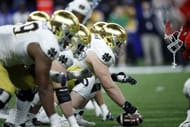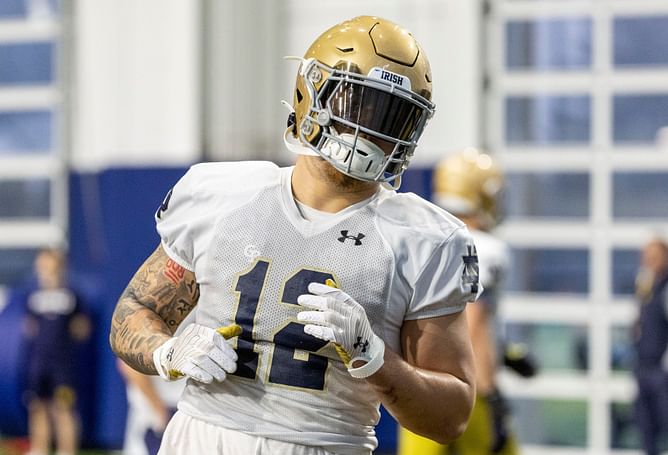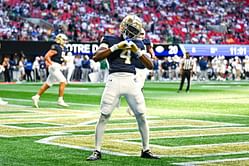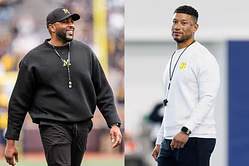Team Information
| Ground | Notre Dame Stadium |
| City | Notre Dame, Indiana |
| Conference | Independents (FBS), |
| Nickname | Fighting Irish |
About Notre Dame Fighting Irish Football

The Notre Dame Fighting Irish football team, as an Independent in the NCAA's Football Bowl Subdivision (FBS), competes separately from any conference affiliation. Despite their independent status, Notre Dame annually plays five games against Atlantic Coast Conference (ACC) opponents, part of their collaboration with the ACC. This unique arrangement allows Notre Dame to maintain independence while engaging in a select number of contests within the ACC.
| Name of the team | Notre Dame Fighting Irish Football |
| First Season | 1887 |
| Athletic Director | Pete Bevacqua |
| Head Coach | Marcus Freeman |
| Stadium | Notre Dame Stadium (capacity: 77,622) |
| Location | Notre Dame, Indiana |
| Field Surface | Natural grass (1930–2013), FieldTurf (2014–present) |
| Division | Division I FBS |
| Conference | Independent |
| Claimed National Titles | 11 (1924, 1929, 1930, 1943, 1946, 1947, 1949, 1966, 1973, 1977, 1988) |
| Conference Titles | N/A |
| Fight Song | Notre Dame Victory March |
| Mascot | Notre Dame Leprechaun |
| Rivals | USC (rivalry), Navy (rivalry), Michigan (rivalry), Michigan State (rivalry), Purdue (rivalry), Pittsburgh (rivalry), Stanford (rivalry), Northwestern (rivalry), Army (rivalry), Boston College (rivalry) |
| Consensus All-Americans | 109 |
Notre Dame Fighting Irish football introduction
The University of Notre Dame Football program, representing the Fighting Irish in Notre Dame, Indiana, is a storied institution with an illustrious history since its 1887 inception. Competing independently in the NCAA's Football Bowl Subdivision (FBS), they engage in five annual games against Atlantic Coast Conference (ACC) opponents. Notre Dame Stadium, hosting 77,622 fans, serves as their iconic battleground. Renowned for their dominance, they boast 11 consensus national championships, including 8 major titles. As of January 2025, even Heisman Trophy recipients have hailed from this program. Despite 21 vacated victories due to NCAA self-reported academic misconduct in 2016, the team holds 945 official wins, as of January 9, 2025. The team has had 22 undefeated seasons and 12 perfect seasons. NBC has televised all their home games since 1991.
Read More: Notre Dame National Championship Wins
Notre Dame Fighting Irish football history
The football journey at the University of Notre Dame commenced on November 23, 1887, marked by a defeat against Michigan with a score of 8–0. However, the Irish secured their first victory in 1888 against Harvard Prep School, concluding the season at 1–3, with three losses to Michigan. Notre Dame's early years, spanning 1887 to 1899, comprised 31 wins, 15 losses, and four ties against various opponents, varying from local high schools to universities.
The turning point arrived in 1894 with the appointment of James L. Morrison as Notre Dame's inaugural head coach. Morrison faced a challenging initiation, encountering players seemingly unfamiliar with the rigors of the game. His strategic coaching marked a pivotal shift, emphasizing discipline and conditioning among players, initiating a path toward stability and recognition for Notre Dame football.
In 1908, Notre Dame made history as end Fay Wood captured the first touchdown pass. The team furthered its success with the initial victory over Michigan in 1909, scoring 11–3. Jesse Harper took over as head coach in 1913, steering the team toward intercollegiate games and a remarkable record of 34 wins, five losses, and one tie. This era heralded the inception of Notre Dame's rivalry with the Army and the continuation of its rivalry with Michigan State.
Under Knute Rockne's coaching, the Notre Dame squad emerged as a powerhouse, amassing 105 wins, 12 losses, and five ties during 1918–1930. Rockne's innovative strategies led to three national championships, five undefeated seasons, and the introduction of prominent players like George Gipp and the "Four Horsemen." Rockne's emphasis on the forward pass transformed football's tactical landscape.
Frank Leahy's tenure from 1941 to 1953 witnessed unparalleled success with 87 wins, 11 losses, and nine ties, securing four national championships and six undefeated seasons. Despite subsequent coaching changes, the legacy of these formidable leaders established Notre Dame's enduring football prominence.
Notre Dame Fighting Irish football coach
As of January 2025, Marcus Freeman is the coach of Notre Dame Fighting Irish football coach. He has been their head coach since 2021.
Below is the list of all the head coaches of the Notre Dame Fighting Irish football team as of January 2025,
| Years | Coach |
| 1887–1889, 1892–1893 | None |
| 1894 | James L. Morrison |
| 1895 | H.G. Hadden |
| 1896–1898 | Frank E. Hering |
| 1899 | James McWeeney |
| 1900–1901 | Pat O'Dea |
| 1902–1903 | James F. Faragher |
| 1904 | Red Salmon |
| 1905 | Henry J. McGlew |
| 1906–1907 | Thomas A. Barry |
| 1908 | Victor M. Place |
| 1909–1910 | Shorty Longman |
| 1911–1912 | Jack Marks |
| 1913–1917 | Jesse Harper |
| 1918–1930 | Knute Rockne |
| 1931–1933 | Hunk Anderson |
| 1934–1940 | Elmer Layden |
| 1941–1943, 1946–1953 | Frank Leahy |
| 1944 | Ed McKeever |
| 1945, 1963 | Hugh Devore |
| 1954–1958 | Terry Brennan |
| 1959–1962 | Joe Kuharich |
| 1964–1974 | Ara Parseghian |
| 1975–1980 | Dan Devine |
| 1981–1985 | Gerry Faust |
| 1986–1996 | Lou Holtz |
| 1997–2001 | Bob Davie |
| 2001† | George O'Leary |
| 2002–2004 | Tyrone Willingham |
| 2004‡ | Kent Baer |
| 2005–2009 | Charlie Weis |
| 2010–2021 | Brian Kelly |
| 2021–present | Marcus Freeman |
Notre Dame Fighting Irish football stadium: Notre Dame Stadium
Notre Dame Stadium, nestled in Notre Dame, Indiana, stands as the home ground for the University of Notre Dame Fighting Irish football team. Opened in 1930 at the behest of legendary coach Knute Rockne, it earned the moniker "The House that Rockne Built." Evolving from its initial capacity of nearly 60,000, expansions in 1994-1997 surged seating to over 80,000, later adjusted to 77,622 during the 2014 Campus Crossroads renovation. Admired for its ageless charm, iconic stature, and famed view of the Touchdown Jesus mural, the stadium boasts an artificial turf since 2014.
Read More: Notre Dame Fighting Irish Stadium
Notre Dame Fighting Irish football rivals
Notre Dame Football's storied legacy features fierce rivalries with USC, Navy, Michigan, Michigan State, Stanford, and Pitt, and the intense matchups with Miami (FL) in the 1980s. The Jeweled Shillelagh contests with USC, the enduring clashes with Navy and Purdue, and historic battles with Michigan, Michigan State for the Megaphone Trophy, Stanford, Pitt, and the famed "Catholics vs. Convicts" games against Miami (FL) have defined the team's competitive spirit.
Notre Dame Fighting Irish football record and stats
The Notre Dame Fighting Irish Football team boasts an illustrious history, with a record of 958 wins, 338 losses, and 42 ties as of January 9, 2025. This remarkable record places them among the elite programs in college football, securing a winning percentage of .732, ranking fourth all-time. Their 958 victories are fourth among historic football powerhouses, trailing behind Ohio State, Alabama, and Michigan. Notably, their 338 losses stand as one of the lowest among programs with a century-long football legacy, tied with Oklahoma, only surpassed by Ohio State's 331 losses. In intra-state matchups, Notre Dame holds a dominant stance, including a perfect record against Ball State (1-0) and Valparaiso (1-0). They have notably prevailed against Indiana with a 23-5-1 record and maintained a winning streak of six games against Purdue with a 57-26-2 overall record against their in-state rivals.
Notre Dame Fighting Irish football roster
The Notre Dame Fighting Irish Football team boasts a diverse and talented roster across offense and defense. Quarterbacks, including Steve Angeli, C.J Carr, Anthony Rezac, Riley Leonard, and Kenny Minchey, are spearheading the offense, each bringing their strengths to the field. Skillful players like Gi’Bran Payne, Jadarian Price, Jake Tafelski, Dylan Devezin, Justin Fisher and Devyn Ford hold the running back positions, offering depth and dynamism to the team's ground game. On the defensive front, standouts like Xavier Watts, Jordan Clark, Rod Heard II, Jaylen Sneed, RJ Oben, Loghan Thomas fortify the team with their prowess, size, and strategic defensive capabilities.
Notre Dame Fighting Irish football schedule
The Notre Dame Fighting Irish Football team navigated a compelling season, engaging in intense matchups against formidable opponents. The team began their 2024-25 season with a win against Texas A&M with a 23-13 victory. However, in their next game against Northern Illinois, they lost a close game 14-16. They concluded their regular season with a win against the University of Southern California with a 49-35 scoreline.
FAQs on Notre Dame Fighting Irish Football
Notre Dame boasts an impressive all-time record of 958 wins, 338 losses, and 42 ties, securing a .732 winning percentage.
A. Notre Dame's significant rivalries include USC, Navy, Michigan, Michigan State, Stanford, Pitt, and historic matchups with Miami (FL). These intense contests have shaped the team's competitive spirit and college football's landscape.
A. Notre Dame claims 11 consensus national championships, including 8 major titles.
A. Coaches like Knute Rockne, Ara Parseghian, Frank Leahy, and Lou Holtz have significantly shaped Notre Dame Football, securing championships, and undefeated seasons and establishing the program's historic prominence.
A. Despite being an Independent in the NCAA's Football Bowl Subdivision (FBS). Notre Dame plays five annual games against ACC opponents, maintaining independence while fostering a distinctive partnership within college football.




